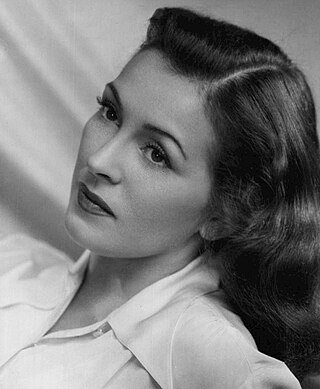
Nancy Kelly was an American actress in film, theater, and television. A child actress and model, she was a repertory cast member of CBS Radio's The March of Time, and appeared in several films in the late 1920s. She became a leading lady upon returning to the screen in the late 1930s, while still in her teens, and made two dozen movies between 1938 and 1946, including portraying Tyrone Power's love interest in the classic Jesse James (1939), which also featured Henry Fonda, and playing opposite Spencer Tracy in Stanley and Livingstone, later that same year. After turning to the stage in the late 1940s, she had her greatest success in a character role, the distraught mother in The Bad Seed, receiving a Tony Award for Best Actress in a Play for the 1955 stage production and an Academy Award nomination as Best Actress for the 1956 film adaptation, her last film role. Kelly then worked regularly in television until 1963, then took over the role of Martha in the original Broadway production of Who's Afraid of Virginia Woolf? for several months. She returned to television for a handful of appearances in the mid-1970s.
Gunnery Sergeant (GySgt) is the seventh enlisted rank in the United States Marine Corps, above staff sergeant and below master sergeant and first sergeant, and is a senior non-commissioned officer (SNCO). It has a pay grade of E-7.

Forrest Meredith Tucker was an American actor in both movies and television who appeared in nearly a hundred films. Tucker worked as a vaudeville straight man at the age of fifteen. A mentor provided funds and contacts for a trip to California, where party hostess Cobina Wright persuaded guest Wesley Ruggles to give Tucker a screen test because of Tucker's photogenic good looks, thick wavy hair and height of six feet, five inches.

Windtalkers is a 2002 American war film directed and co-produced by John Woo, starring Nicolas Cage, Adam Beach, Peter Stormare, Noah Emmerich, Mark Ruffalo, and Christian Slater. It is based on the real story of code talkers from the Navajo nation during World War II. The film was theatrically released in the United States on June 14, 2002, receiving mixed reviews and becoming a box-office bomb, grossing just $77.6 million worldwide against a production budget of $115 million.

John Howard Payne was an American film actor who is mainly remembered from film noir crime stories and 20th Century Fox musical films, and for his leading roles in Miracle on 34th Street and the NBC Western television series The Restless Gun.

Allan Jay Kellogg Jr. is a retired sergeant major in the United States Marine Corps. He received the United States military's highest decoration, the Medal of Honor, for his actions as a staff sergeant on March 11, 1970, during the Vietnam War.
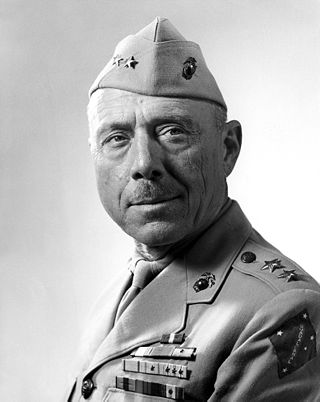
The Rifleman's Creed is a part of basic United States Marine Corps doctrine. Major General William H. Rupertus wrote it during World War II following the attack on Pearl Harbor between late 1941 and early 1942, but its first publication was in San Diego in the Marine Corps Chevron on March 14, 1942. His reasoning for writing the Creed is believed to be that he felt that his men had to understand the concept "that the only weapon which stands between them and Death is the rifle…they must understand that their rifle is their life…"

Robert Earl Cleary was a United States Marine who served as the 10th Sergeant Major of the Marine Corps from 1983 to 1987. He served in the Marine Corps for 36 years, including seeing combat in both the Korean War and the Vietnam War. For his actions in Vietnam, he was awarded the Silver Star, the Navy Commendation Medal, and two Purple Hearts. He was the last Sergeant Major of the Marine Corps to have served in the Korean War.
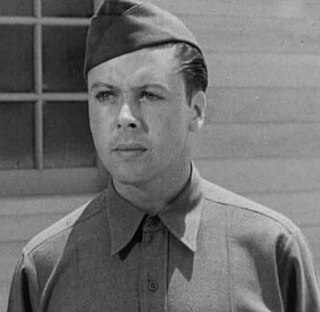
William Tracy was an American character actor.
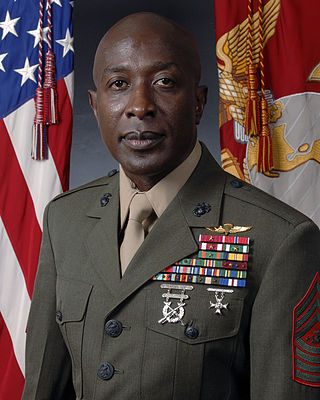
Carlton Wayne Kent is a retired United States Marine who served as the 16th Sergeant Major of the Marine Corps. He succeeded John L. Estrada on April 25, 2007, and was succeeded by Micheal Barrett on June 9, 2011.
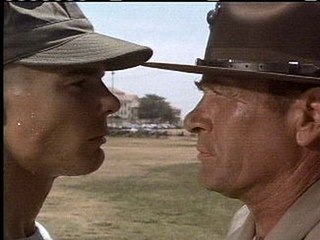
Tribes, also known as The Soldier Who Declared Peace (UK), is a 1970 American television drama film broadcast as an ABC Movie of the Week directed by Joseph Sargent. A big ratings success when it first aired November 10, 1970, Tribes was later released theatrically in Britain and Europe under the title The Soldier Who Declared Peace. Tribes has been released on VHS, but as of 2018 has not been released on DVD.
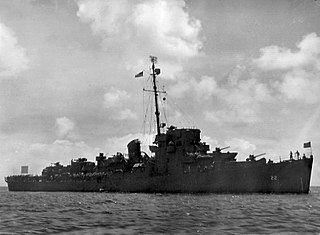
USS Wileman (DE-22) was an Evarts-class destroyer escort constructed for the United States Navy during World War II. It was promptly sent off into the Pacific Ocean to protect convoys and other ships from Japanese submarines and fighter aircraft. At the end of the war, she returned to the United States proudly displaying four battle stars.
Gung Ho! is a 1943 American war film directed by Ray Enright and starring Randolph Scott. The story is based somewhat on the real-life World War II Makin Island raid led by Lieutenant Colonel Evans Carlson's 2nd Marine Raider Battalion.

Iceland is a 1942 musical film released by 20th Century-Fox, directed by H. Bruce Humberstone and stars skater Sonja Henie and John Payne as a U.S. Marine posted in Iceland during World War II. The film was titled Katina in Great Britain and Marriage on Ice in Australia.

Aerial Gunner is a 1943 American black-and-white World War II propaganda film produced by William C. Thomas and William H. Pine, who also directed. The film stars Chester Morris, Richard Arlen, and Jimmy Lydon. This was the first feature film directed by Pine, who produced other films through his company, Pine-Thomas Productions. Aerial Gunner was distributed by Paramount Pictures.
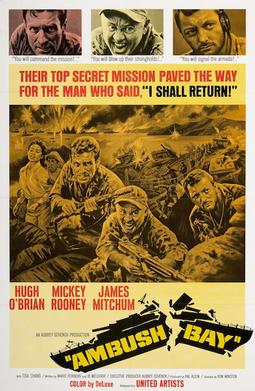
Ambush Bay is a 1966 American war film directed by Ron Winston and starring Hugh O'Brian, Mickey Rooney and James Mitchum. It was filmed on location in the Philippines.

Marine Raiders is a 1944 RKO war film showing a fictional depiction of the 1st Marine Raider Battalion and 1st Marine Parachute Battalion on Guadalcanal, R&R in Australia, retraining in Camp Elliott and a fictional attack in the Solomon Islands. Produced by Robert Fellows, and directed by Harold D. Schuster, it stars Pat O'Brien, Robert Ryan, and Ruth Hussey.
Ten Gentlemen from West Point is a 1942 American Western film directed by Henry Hathaway and starring George Montgomery, Maureen O'Hara and John Sutton. Its cinematography was nominated for an Academy Award in 1943. George Montgomery replaced John Payne who was suffering an emotional upset at the time. The story tell a fictional story of the first class of the United States Military Academy in the early 1800s.

China Sky is a 1945 RKO Pictures film based on the novel by Pearl S. Buck. It was directed by Ray Enright and featured movie idol Randolph Scott, teamed with Ruth Warrick, Ellen Drew and Anthony Quinn. Although set in wartime China, Quinn and other lead actors portrayed Chinese characters, in keeping with other period films that employed Caucasian actors in Asian roles.

Tripoli is a 1950 American adventure film directed by Will Price and written by Winston Miller. The film is a fictionalized account of the Battle of Derna at Derna, a coastal town in modern eastern Libya in April 1805 against Tripoli, one of the four Barbary states in North Africa and stars John Payne, Maureen O'Hara, Howard Da Silva, Phillip Reed, Grant Withers, Lowell Gilmore and Connie Gilchrist. The film was released on November 9, 1950, by Paramount Pictures. The film was re-released by Citation Films Inc. and retitled The First Marines.

















